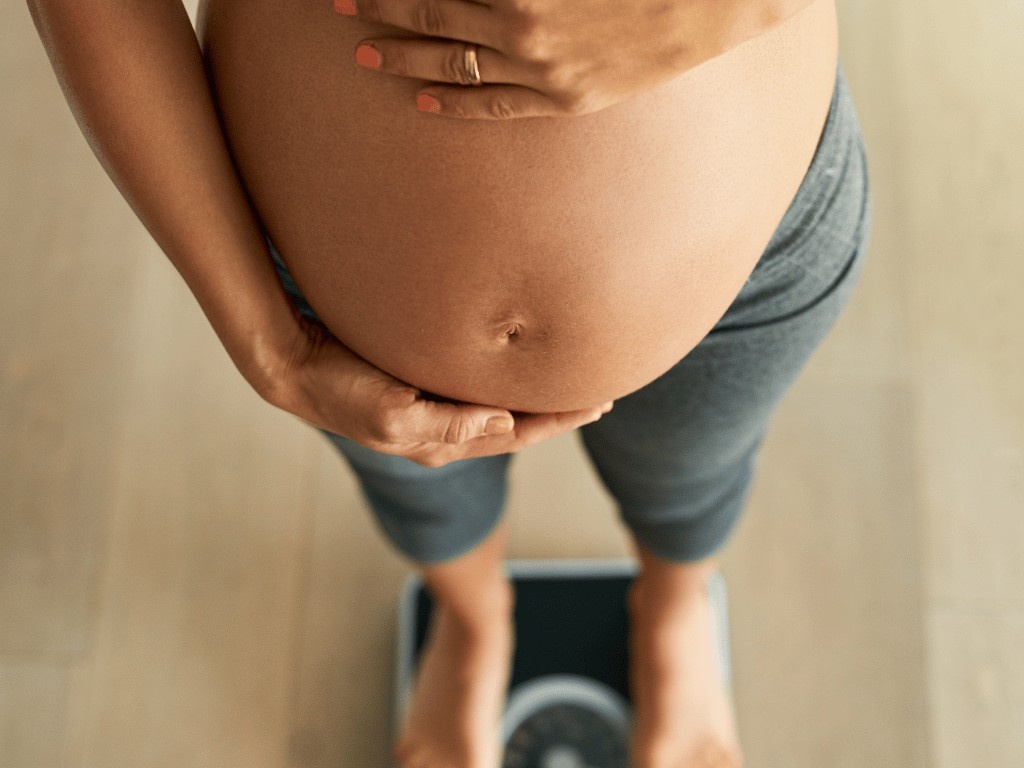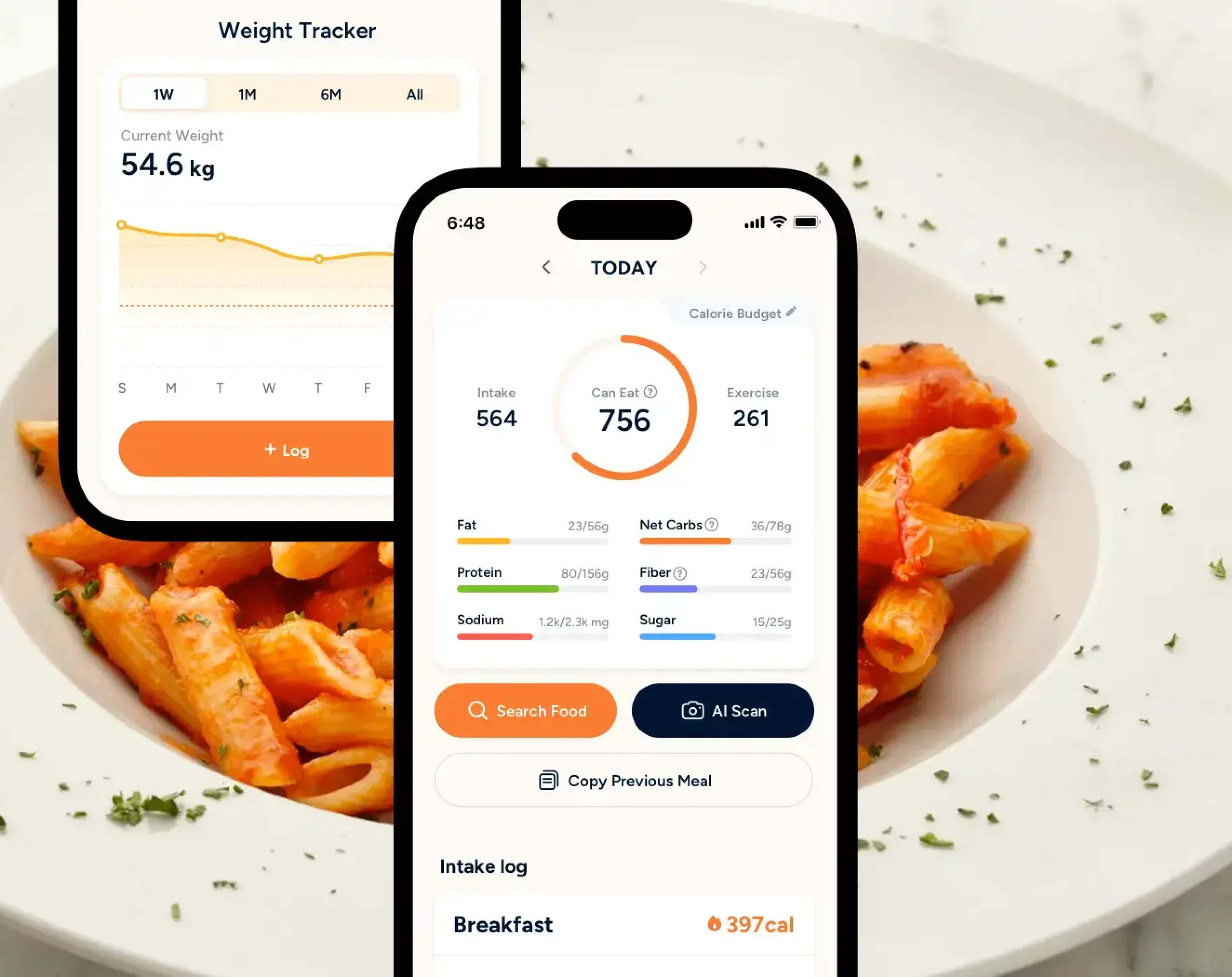Your body goes through incredible changes during pregnancy. I don’t mean just in the way you feel, but in how much weight you gain. While some expectant moms worry about suddenly gaining “too much,” others fear they’re not gaining enough. The truth is, healthy pregnancy weight gain looks different for everyone, and understanding what’s normal for weight gain during pregnancy can help you focus on what really matters: nourishing your body and supporting your baby’s growth.
Key Takeaways
- Your body naturally gains weight to support fetal growth, placenta development, amniotic fluid, and increased blood and water retention.
- Recommended weight gain ranges differ based on BMI and whether you’re carrying one baby or twins.
- Some women may gain 2–4 lbs (1–2 kg) or none at all in the first trimester, but from the second trimester onward, weekly weight gain is expected.
- Typically, half of the pregnancy weight is lost within six weeks after birth, and the rest gradually comes off over 6–12 months.
- Managing pregnancy weight is about nourishing your body, practicing gentle activity, and embracing mindful self-care.
What Happens Throughout Pregnancy?

During pregnancy, the body is bound to undergo various changes to support the growth of the fetus. Major changes can be observed in the cardiovascular, respiratory, gastrointestinal, and urinary systems as a response to how the baby develops throughout the trimesters.
Aside from this, another change commonly witnessed by pregnant women is their weight. Since the fetus will continue to grow until it reaches their full size, the mother will naturally need to consume more food and calories to feed and nurture that growth.
Thus, weight gain during pregnancy is bound to happen, especially in the third trimester of pregnancy. Other factors that also contribute to this weight gain include increased water retention, the placenta, and the amniotic fluid in the body [1].
Is It Possible Not to Gain Weight During Pregnancy?
For the first trimester, some women may see a slight weight gain of 2 to 4 lb (1-2kg) while some might not gain any weight at all. This is perfectly normal.
But if you are expecting not to gain weight throughout the entire pregnancy, this is not possible. From the second trimester onwards, most pregnant women can expect to gain 1 lb (0.5kg) every week until they reach their due date [2].
How Much Weight Should You Gain During Pregnancy?

The amount of weight you should be gaining during pregnancy would depend on your pre-pregnancy body mass index (BMI).
According to the U.S. Centers for Disease Control and Prevention (CDC), the recommended healthy weight gain for women with one baby is as follows [3]:
- If you had a BMI of less than 18.5 before pregnancy, you should aim to put on 28 to 40 pounds (14-20 kg).
- If you had a BMI of 18.5 to 24.9 before pregnancy, you should aim to put on 25 to 35 pounds (12.5-17.5 kg).
- If you had a BMI of 25 to 29.9 before pregnancy, you should aim to put on 15 to 25 pounds (7.5-12.5 kg).
- If you had a BMI of 30 to 39.9 before pregnancy, you should aim to put on 11 to 20 pounds (5.5-10 kg).
For women pregnant with twins, these are the weight gain recommendations:
- If you have a BMI of less than 18.5 before pregnancy, you should aim to put on 50 to 62 pounds (25-31 kg).
- If you have a BMI of 18.5 to 24.9 before pregnancy, you should aim to put on 37 to 54 pounds (18.5-27 kg).
- If you have a BMI of 25 to 29.9 before pregnancy, you should aim to put on 31 to 50 pounds (15.5-25 kg).
- If you have a BMI of 30 to 39.9 before pregnancy, you should aim to put on 25 to 42 pounds (12.5-21 kg).

Smarter Nutrition Tracking
Track calories and over 100 other nutrients all in one place.
Download Eato For FreePregnancy Weight Gain Chart
Here are also pregnancy weight gain charts to help you visualize the recommended amount of weight gain.
| Pre-pregnancy BMI | Recommended weight gain for one baby |
| less than 18.5 | 28 to 40 pounds (14-20 kg) |
| 18.5–24.9 | 25 to 35 pounds (12.5-17.5 kg) |
| 25–29.9 | 15 to 25 pounds (7.5-12.5 kg) |
| 30–39.9 | 11 to 20 pounds (5.5-10 kg) |
| Pre-pregnancy BMI | Recommended weight gain for twins |
| less than 18.5 | 50 to 62 pounds (25-31 kg) |
| 18.5–24.9 | 37 to 54 pounds (18.5-27 kg) |
| 25–29.9 | 31 to 50 pounds (15.5-25 kg) |
| 30–39.9 | 25 to 42 pounds (12.5-21 kg) |
How to Lose Weight After Pregnancy

After giving birth, you may be thinking of how you can lose all the weight that you have gained during pregnancy and return to your pre-pregnancy weight.
Normally, most women should be able to lose half of the total weight gain 6 weeks after postpartum. The remaining weight should slowly come off in the next 6 to 12 months [4].
If you need to speed up the process, you can try these sustainable methods:
Start eating healthy: The importance of eating healthy cannot be understated, especially after a medically intensive process like pregnancy. You’ll need to eat nutritious foods to nourish your body. Eating healthy means not skipping meals, choosing to eat whole foods instead of processed foods, and limiting your sugar intake, eating low sodium foods, less saturated fats, and trans fats.
Avoid crash diets: Do not attempt to go on a crash diet or fad diet. Most times, while they may seem like a good solution, they help you drop weight too fast. But it is usually water weight that you’ll end up gaining back.
Exercise regularly: Combining regular exercise with a healthy diet can help to quicken the weight loss process. It helps you to shed excess fat stores instead of your muscles.
Be realistic and give yourself time: Going back to your normal weight takes time, and you need to understand that you won’t be able to lose all that you’ve gained in 1 to 2 months. You may have a softer belly or wider hips, and it’s a norm that you will have to embrace.
The Final Takeaway: On Managing Pregnancy Weight
Pregnancy before, after, and during can be both physically and emotionally intensive on the female body; however, managing pregnancy weight does not mean you should restrict yourself or aim for perfection, but rather balance. Taking care of yourself and your baby is important for both of you, and every pregnancy is different. Listen to your body and consult your medical team rather than rely on judgment based solely on the numbers on your scale.
If you need a little extra support, you may want to consider using the Eato app. Eato helps you to track your meals, monitor your water intake, and build healthy habits with confidence throughout your pregnancy. Try it today for free!

Weight Loss Has Never Been Easier
Get accurate nutrition info instantly. Keep track of your progress.
Download Eato For Free



